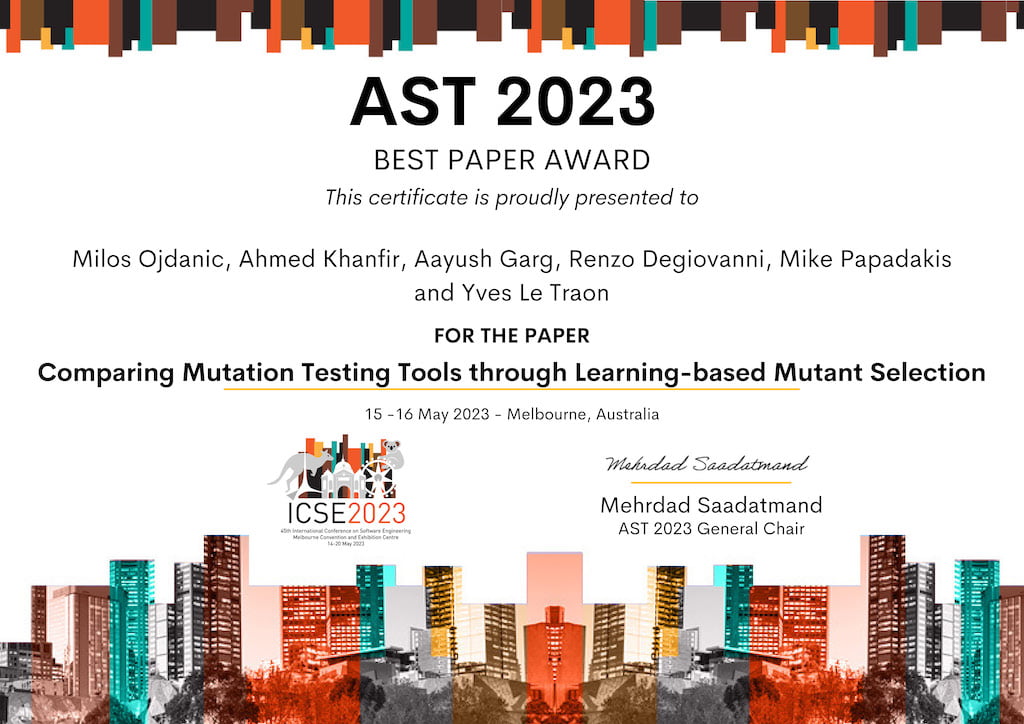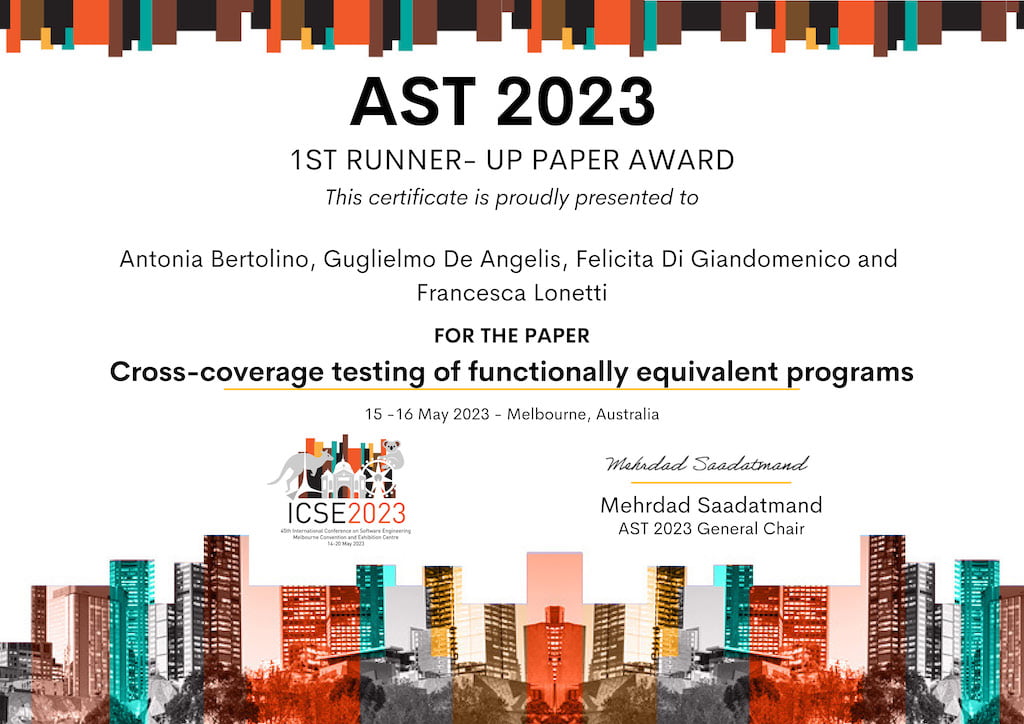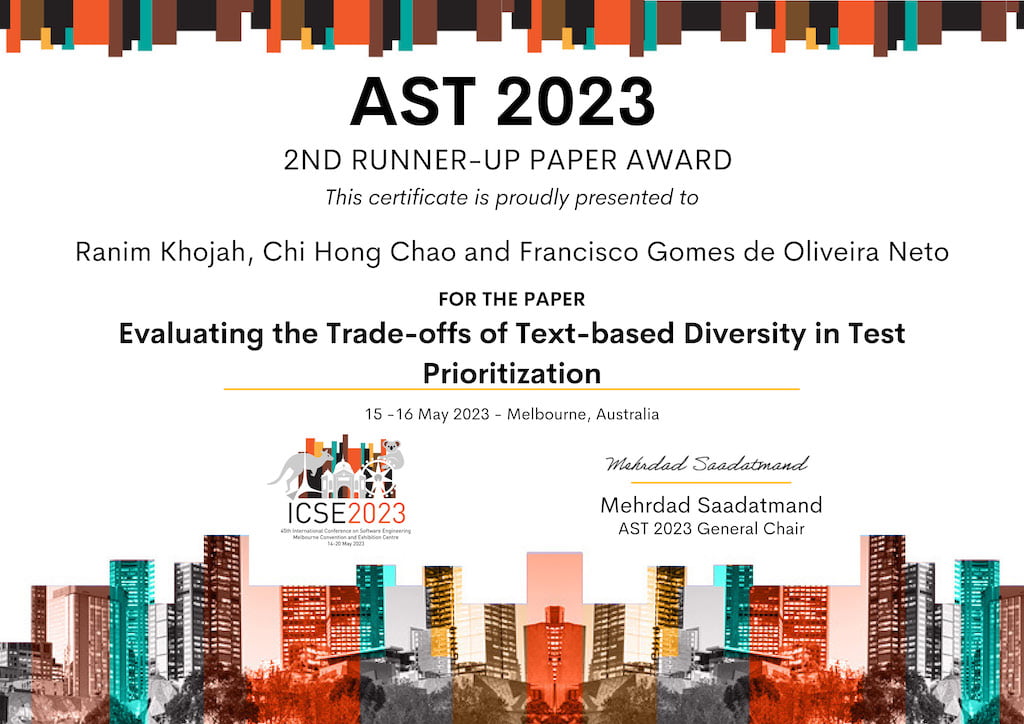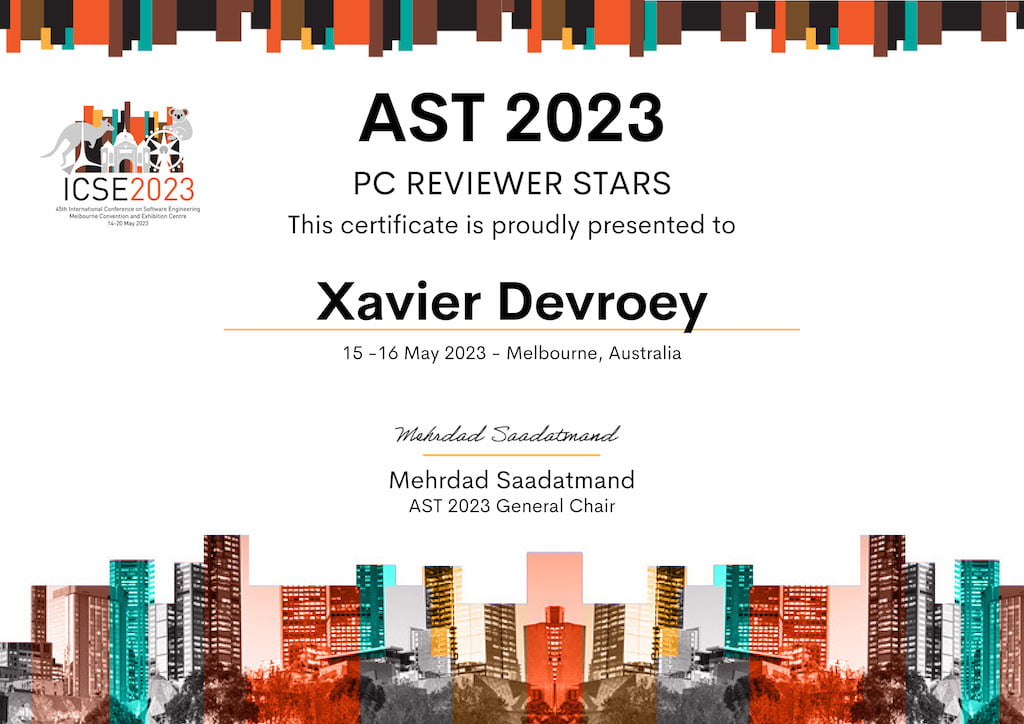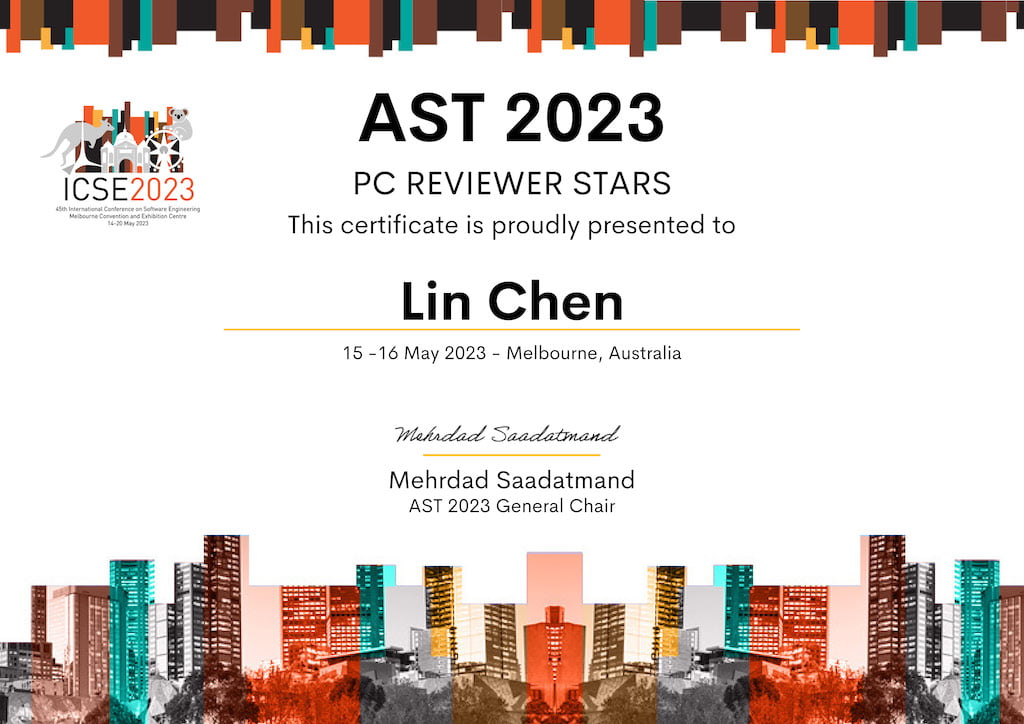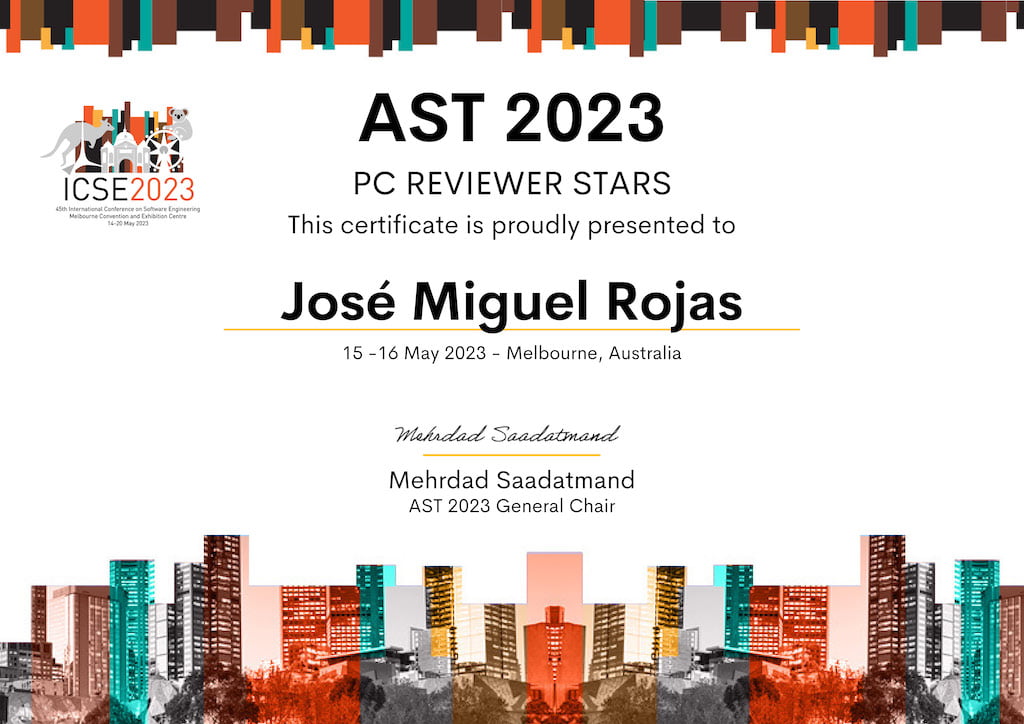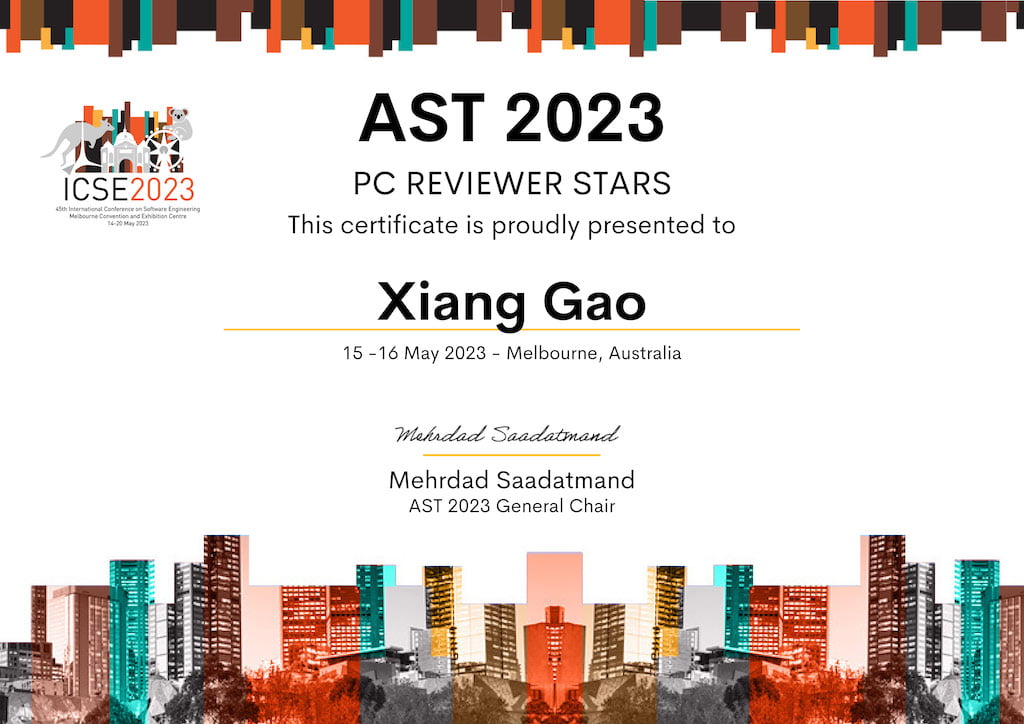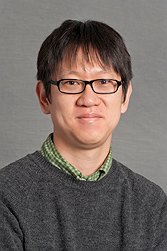The 4th ACM/IEEE International Conference on Automation of Software Test (AST 2023)
Software pervasiveness in both industry and digital society, as well as the proliferation of Artificial Intelligence (AI) technologies are continuously leading to emerging needs from both software producers and consumers. Infrastructures, software components, and applications aim to hide their increasing complexity in order to appear more human-centric. However, the potential risk from design errors, poor integrations, and time-consuming engineering phases can result in unreliable solutions that can barely meet their intended objectives. In this context, Software Engineering processes keep demanding for the investigation of novel and further refined approaches to Software Quality Assurance (SQA). Software testing automation is a discipline that has produced noteworthy research in the last decade. The search for solutions to automatically test any concept of software is critical, and it encompasses several areas: from the generation of the test cases, test oracles, test stubs/mocks; through the definition of selection and prioritization criteria; up to the engineering of infrastructures governing the execution of testing sessions locally or remotely in the cloud.
AST continues with a long record of international scientific forums on methods and solutions to automate software testing. This year AST 2023 is the 4th edition of a conference that was formerly organized as workshops since 2006. The conference promotes high quality research contributions on methods for software test automation, and original case studies reporting practices in this field. We invite contributions that focus on: i) lessons learned about experiments of automatic testing in practice; ii) experiences of the adoption of testing tools, methods and techniques; iii) best practices to follow in testing and their measurable consequences; and iv) theoretical approaches that are applicable to the industry in the context of AST.
Authors of the best papers presented at AST 2023 will be invited to submit an extension of their work for possible inclusion in a special issue in Software Testing, Verification, and Reliability (STVR) journal.
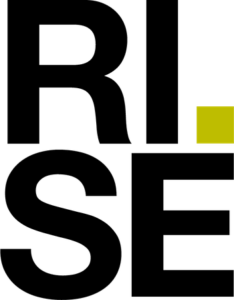

Mon 15 MayDisplayed time zone: Hobart change
09:00 - 10:30 | |||
09:00 30mTalk | Automation of Software Test; Confererence - Past, Present and Visions AST 2023 Mehrdad Saadatmand RISE Research Institutes of Sweden, Sigrid Eldh Ericsson AB, Mälardalen University, Carleton Unviersity | ||
09:30 60mKeynote | Lessons from 10 Years of Automated Debugging Research AST 2023 Media Attached | ||
11:00 - 12:30 | |||
11:00 22mTalk | An Method of Intelligent Duplicate Bug Report Detection Based on Technical Term Extraction AST 2023 Xiaoxue Wu Yangzhou University, Wenjing Shan Yangzhou University, Wei Zheng Northwestern Polytechnical University, Zhiguo Chen Northwestern Polytechnical University, Tao Ren Yangzhou University, Xiaobing Sun Yangzhou University | ||
11:22 22mTalk | A Reinforcement Learning Approach to Generate Test Cases for Web Applications AST 2023 Xiaoning Chang Institute of Software, Chinese Academy of Sciences, Zheheng Liang Joint Laboratory on Cyberspace Security of China Southern Power Grid, Yifei Zhang State Key Lab of Computer Sciences, Institute of Software, Chinese Academy of Sciences, Lei Cui Joint Laboratory on Cyberspace Security of China Southern Power Grid, Zhenyue Long , Guoquan Wu Institute of Software at Chinese Academy of Sciences; University of Chinese Academy of Sciences; University of Chinese Academy of Sciences Nanjing College; China Southern Power Grid, Yu Gao Institute of Software, Chinese Academy of Sciences, China, Wei Chen Institute of Software at Chinese Academy of Sciences; University of Chinese Academy of Sciences; University of Chinese Academy of Sciences Nanjing College, Jun Wei Institute of Software at Chinese Academy of Sciences; University of Chinese Academy of Sciences; University of Chinese Academy of Sciences Chongqing School, Tao Huang Institute of Software Chinese Academy of Sciences | ||
11:45 22mTalk | Cross-Project setting using Deep learning Architectures in Just-In-Time Software Fault Prediction: An Investigation AST 2023 Sushant Kumar Pandey Chalmers and University of Gothenburg, Anil Kumar Tripathi Indian Institute of Technology (BHU), Varanasi | ||
12:07 22mTalk | On Comparing Mutation Testing Tools through Learning-based Mutant Selection AST 2023 Milos Ojdanic University of Luxembourg, Ahmed Khanfir University of Luxembourg, Aayush Garg University of Luxembourg, Luxembourg, Renzo Degiovanni SnT, University of Luxembourg, Mike Papadakis University of Luxembourg, Luxembourg, Yves Le Traon University of Luxembourg, Luxembourg File Attached | ||
15:45 - 17:15 | |||
15:45 22mTalk | Better Safe Than Sorry! Automated Identification of Functionality-Breaking Security-Configuration Rules AST 2023 Patrick Stöckle Technical University of Munich (TUM) / Siemens AG, Michael Sammereier Technical University of Munich, Bernd Grobauer Siemens AG, Alexander Pretschner Technical University of Munich Link to publication DOI Pre-print | ||
16:07 22mTalk | Cross-coverage testing of functionally equivalent programs AST 2023 Antonia Bertolino National Research Council, Italy, Guglielmo De Angelis CNR-IASI, Felicita Di Giandomenico ISTI-CNR, Francesca Lonetti CNR-ISTI Pre-print | ||
16:30 22mTalk | Towards a Review on Simulated ADAS/AD Testing AST 2023 | ||
18:00 - 21:00 | |||
18:00 3hSocial Event | Social Dinner at Meat Market, South Wharf AST 2023 | ||
Tue 16 MayDisplayed time zone: Hobart change
09:00 - 10:30 | |||
09:00 30mTalk | AST Day II Welcome AST 2023 | ||
09:30 60mKeynote | Automatic for the People AST 2023 Media Attached | ||
11:00 - 12:30 | |||
11:00 22mTalk | On the Effect of Instrumentation on Test Flakiness AST 2023 Shawn Rasheed Universal College of Learning, Jens Dietrich Victoria University of Wellington, Amjed Tahir Massey University Pre-print | ||
11:22 22mTalk | Debugging Flaky Tests using Spectrum-based Fault Localization AST 2023 Pre-print | ||
11:45 22mTalk | FlakyCat: Predicting Flaky Tests Categories using Few-Shot Learning AST 2023 Amal Akli University of Luxembourg, Guillaume Haben University of Luxembourg, Sarra Habchi Ubisoft, Mike Papadakis University of Luxembourg, Luxembourg, Yves Le Traon University of Luxembourg, Luxembourg | ||
12:07 22mTalk | Detecting Potential User-data Save & Export Losses due to Android App Termination AST 2023 Sydur Rahaman New Jersey Institute of Technology, Umar Farooq University of California at Riverside, Iulian Neamtiu New Jersey Institute of Technology, Zhijia Zhao University of California at Riverside | ||
13:45 - 15:15 | |||
13:45 22mTalk | Orchestration Strategies for Regression Test Suites AST 2023 Renan Greca Gran Sasso Science Institute, ISTI-CNR, Breno Miranda Federal University of Pernambuco, Antonia Bertolino National Research Council, Italy Pre-print | ||
14:07 22mTalk | Evaluating the Trade-offs of Text-based Diversity in Test Prioritization AST 2023 Ranim Khojah Chalmers | University of Gothenburg, Chi Hong Chao Chalmers | University of Gothenburg, Francisco Gomes de Oliveira Neto Chalmers University of Technology, Sweden / University of Gothenburg, Sweden | ||
14:30 22mTalk | MuTCR: Test Case Recommendation via Multi-Level Signature Matching AST 2023 Weisong Sun Nanjing University, Weidong Qian China Ship Scientific Research Center, Bin Luo Nanjing University, Zhenyu Chen Nanjing University | ||
14:52 22mTalk | Test Case Prioritization using Transfer Learning in Continuous Integration Environments AST 2023 Rezwana Mamata Ontario Tech University, Akramul Azim Ontario Tech University, Ramiro Liscano Ontario Tech University, Kevin Smith International Business Machines Corporation (IBM), Yee-Kang Chang International Business Machines Corporation (IBM), Gkerta Seferi International Business Machines Corporation (IBM), Qasim Tauseef International Business Machines Corporation (IBM) | ||
15:45 - 17:15 | |||
15:45 45mPanel | Panel Discussions and AST Summary Remarks AST 2023 Andy Zaidman Delft University of Technology, Antonia Bertolino National Research Council, Italy, Mike Papadakis University of Luxembourg, Luxembourg, Shin Yoo KAIST, Sigrid Eldh Ericsson AB, Mälardalen University, Carleton Unviersity, Mehrdad Saadatmand RISE Research Institutes of Sweden | ||
16:30 45mAwards | Award Session and Closure AST 2023 | ||
Accepted Papers
Call for Papers
Software pervasiveness in both industry and digital society, as well as the proliferation of Artificial Intelligence (AI) technologies are continuously leading to emerging needs from both software producers and consumers. Infrastructures, software components, and applications aim to hide their increasing complexity in order to appear more human-centric. However, the potential risk from design errors, poor integrations, and time-consuming engineering phases can result in unreliable solutions that can barely meet their intended objectives. In this context, Software Engineering processes keep demanding for the investigation of novel and further refined approaches to Software Quality Assurance (SQA). Software testing automation is a discipline that has produced noteworthy research in the last decade. The search for solutions to automatically test any concept of software is critical, and it encompasses several areas: from the generation of the test cases, test oracles, test stubs/mocks; through the definition of selection and prioritization criteria; up to the engineering of infrastructures governing the execution of testing sessions locally or remotely in the cloud. AST continues with a long record of international scientific forums on methods and solutions to automate software testing. This year AST 2023 is the 4th edition of a conference that was formerly organized as workshops since 2006. The conference promotes high quality research contributions on methods for software test automation, and original case studies reporting practices in this field. We invite contributions that focus on:
- lessons learned about experiments of automatic testing in practice;
- experiences of the adoption of testing tools, methods and techniques;
- best practices to follow in testing and their measurable consequences; and
- theoretical approaches that are applicable to the industry in the context of AST.
Topics of Interest
Submissions on the AST 2023 theme are especially encouraged, but papers on other topics relevant to the automation of software tests are also welcome. Topics of interest include, but are not limited to the following:
- Test automation of large complex system
- Test Automation in Software Process and Evolution, DevOps, Agile, CI/CD flows
- Metrics for testing - test efficiency, test coverage
- Tools for model-based V&V
- Test-driven development
- Standardization of test tools
- Test coverage metrics and criteria
- Product line testing
- Formal methods and theories for testing and test automation
- Test case generation based on formal and semi-formal models
- Testing with software usage models
- Testing of reactive and object-oriented systems
- Software simulation by models, forecasts of behavior and properties
- Application of model checking in testing
- Tools for security specification, models, protocols, testing and evaluation
- Theoretical foundations of test automation
- Models as test oracles; test validation with models
- Testing anomaly detectors
- Testing cyber physical systems
- Automated usability and user experience testing
- Automated software testing for AI applications
- AI for Automated Software Testing
We are interested in the following aspects related to AST:
- Problem identification. Analysis and specification of requirements for AST, and elicitation of problems that hamper wider adoption of AST
- Methodology. Novel methods and approaches for AST in the context of up-to-date software development methodologies
- Technology. Automation of various test techniques and methods for test-related activities, as well as for testing various types of software
- Tools and Environments. Issues and solutions in the development, operation, maintenance and evolution of tools and environments for AST, and their integration with other types of tools and runtime support platforms
- Empirical studies, Experience reports, and Industrial Contributions. Real experiences in using automated testing techniques, methods and tools in industry
- Visions of the future. Foresight and thought-provoking ideas for AST that can inspire new powerful research trends.
Authors of the best papers presented at AST 2023 will be invited to submit an extension of their work for possible inclusion in a special issue in Software Testing, Verification, and Reliability (STVR) journal
Presentation Instructions
To prepare your presentations, please read carefully the instructions that are provided in the following links/documents: 1) https://conf.researchr.org/attending/icse-2023/workshop-and-co-located-event-instructions
2) https://conf.researchr.org/getImage/icse-2023/orig/Presenter+Information+.pdf
Submission
Three types of submissions are invited for both research and industry:
1. Regular Papers (up to 10 pages plus 2 additional pages of references)
- Research Paper
- Industrial Case Study
2. Short Papers (up to 4 pages plus 1 additional page of references)
- Research Paper
- Industrial Case Study
- Doctoral Student Research
3. Industrial Abstracts (up to 2 pages for all materials)
Instructions: Regular papers include both Research papers that present research in the area of software test automation, and Industrial Case Studies that report on practical applications of test automation. Regular papers must not exceed 10 pages for all materials (including the main text, appendices, figures, tables) plus 2 additional pages of references.
Short papers also include both Research papers and Industrial Case Studies. Short papers must not exceed 4 pages plus 1 additional page of references. As short papers, doctoral students working on software testing are encouraged to submit their work. AST will have an independent session to bring doctoral students working on software testing, with experts assigned to each paper together, to discuss their research in a constructive and international atmosphere, and to prepare for the defense exam. The first author in a submission must be the doctoral student and the second author the advisor. Authors of selected submissions will be invited to make a brief presentation followed by a constructive discussion in a session dedicated to doctoral students.
Industrial abstract talks are specifically conceived to promote industrial participation: We require the first author of such papers to come from industry. Authors of accepted papers get invited to give a talk with the same time length and within the same sessions as regular papers. Industrial abstracts must not exceed 2 pages for all materials.
The submission website is: https://easychair.org/conferences/?conf=ast2023
All submissions must adhere to the following requirements:
- The page limit is strict (10 pages plus 2 additional pages of references for full papers; 4 pages plus 1 additional page of references for short papers; 2 pages for all materials in case of industrial abstracts). It will not be possible to purchase additional pages at any point in the process (including after acceptance).
- Submissions must strictly conform to the IEEE formatting instructions. All submissions must be in PDF.
- Submissions must be unpublished original work and should not be under review or submitted elsewhere while being under consideration. AST 2023 will follow the single-blind review process. In addition, by submitting to AST, authors acknowledge that they are aware of and agree to be bound by the ACM Policy and Procedures on Plagiarism and the IEEE Plagiarism FAQ. The authors also acknowledge that they conform to the authorship policy of the ACM and the authorship policy of the IEEE.
The accepted regular and short papers, case studies, and industrial abstracts will be published in the ICSE 2023 Co-located Event Proceedings and included in the IEEE and ACM Digital Libraries. Authors of accepted papers are required to register and present their accepted paper at the conference in order for the paper to be included in the proceedings and the Digital Libraries.
The official publication date is the date the proceedings are made available in the ACM or IEEE Digital Libraries.
This date may be up to two weeks prior to the first day of ICSE 2023. The official publication date affects the deadline for any patent filings related to published work.
Keynotes
Keynote 1: Lessons from 10 Years of Automated Debugging Research
The last decade or so has seen dramatic developments in automated debugging, including fault localisation and automated program repair. This talk will look back at 10 years of my experience from working on automated debugging, starting from evolving Spectrum Based Fault Localisation, culminating to the latest work on failure reproduction using Large Language Models. We will look at how serendipitous encounters led to new ideas, how getting slightly outside your comfort zone can help you, and how best we can collaborate with industry in order to transfer our research.
Shin Yoo is Associate Professor in the School of Computing, Korea Advanced Institute of Science and Technology (KAIST). He received his PhD from King’s College London in 2009. His research interests include search based software engineering, software testing, fault localisation, and genetic improvements. He received the ACM SIGEVO HUMIES Silver Medal in 2017 for the human competitive application of genetic programming to fault localisation research. He is currently an associate editor for IET Software, Journal of Empirical Software Engineering, and ACM Transactions on Software Engineering and Methodology. He regularly serves in program committees of international conferences in the area of software engineering and software testing. He was the Program Co-chair of International Symposium on Search Based Software Engineering (SSBSE) in 2014, and the Program Co-chair of IEEE International Conference on Software Testing, Verification and Validation (ICST) in 2018. He is the Program Co-chair of ICSE New Ideas and Emerging Results (NIER) track in 2020.
Keynote 2: Automatic for the People
Software testing is one of the key activities to achieve software quality in practice. To that end, both researchers and tool builders have made considerable efforts to make software testing more efficient and more effective. We have the tools, but where do we put our money? In other words, what do we know about software engineers or software testers that actually write and execute tests? What stimulates them, what blocks them, and what do they need from tools, documentation, production code, or their team?
Andy Zaidman is a full professor at Delft University of Technology, the Netherlands. He received his MSc and PhD from the University of Antwerp, Belgium. He has been at Delft University of Technology since 2006.
His research interests include software testing, software evolution and software analytics. He is an active member of the research community and has been involved in the organisation of conferences such as ICSME, WCRE (general chair & program chair), CSMR, VISSOFT (program chair) and MSR (general chair). In 2015 he gave a talk a TEDxDelft “Making Testing Fun”.
In 2013 he received a prestigious NWO Vidi career grant from NWO, the Dutch science foundation, for his work in the area of software testing and software evolution. In 2019, he received the Vici career grant, the most prestigious career grant from the Dutch science foundation.
Follow me on Twitter @azaidman
Registration
Please refer to the ICSE Registration page.
Previous Editions
- 2022 - Pittsburgh, USA
- 2021 - Virtual (originally in Madrid, Spain)
- 2020 - Seoul - South Korea
- 2019 - Montreal - Canada
- 2018 - Gothenburg - Sweden
- 2017 - Buenos Aires - Argentina
- 2016 - Austin - Texas
- 2015 - Firenze - Italy
- 2014 - Hyderabad - India
- 2013 - San Jose California - USA
- 2012 - Zurich - Switzerland
- 2011 - Waikiki - Hawaii
- 2010 - Cape Town - South Africa
- 2009 - Vancouver - Canada
- 2008 - Leipzig - Germany
- 2007 - Minneapolis - USA
- 2006 - Shanghai - China
Awards
AST 2023 Best Paper Awards
- AST 2023 Best Paper Award: Milos Ojdanic, Ahmed Khanfir, Aayush Garg, Renzo Degiovanni, Mike Papadakis, and Yves Le Traon. On Comparing Mutation Testing Tools through Learning-based Mutant Selection
- AST 2023 1st Runner- up Paper Award: Antonia Bertolino, Guglielmo De Angelis, Felicita Di Giandomenico and Francesca Lonetti. Cross-coverage testing of functionally equivalent programs
- AST 2023 2nd Runner-up Paper Award: Ranim Khojah, Chi Hong Chao and Francisco Gomes de Oliveira Neto. Evaluating the Trade-offs of Text-based Diversity in Test Prioritization
PC Reviewer Stars
- Xavier Devroey
- Lin Chen
- José Miguel Rojas
- Xiang Gao
